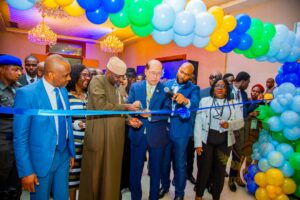Oluyinka Onigbinde
Stakeholders in the nation’s maritime industry have identified absence of finance, inadequate technologies as hindrances to Africa achieving the International Maritime Organisation (IMO) 2050 zero emission deadline.

Speaking during a panel session titled “De-Carbonization and Greenhouse Emissions in Shipping – Policy and Operational Perspectives from West & Central Africa”, at the 2022 edition of the Nigeria International Maritime Summit (NIMS), they stated that the littoral African countries still need finance and adequate technology in other to drive the 2050 zero emission deadline of the IMO.
The Director General of the Nigeria Maritime Administration and Safety Agency (NIMASA), Dr. Bashir Jamoh, disclosed that two-third of the countries affected by recent climate change are from Africa, adding that African countries must speak with one voice if the continent desire to achieve the 2050 deadline of the IMO.
According to Jamoh, aside from lack of financing, others include lack of adequate technologies in driving the 2050 agenda.
He however said that the African states are developing a plan for the continent to come together to ensure implementation and achievement of the 2050 deadline.
Also speaking, a member of the Nigeria Shipowners Association (NISA) Aminu Umar lamented the long waiting time for vessels at the port as a factor hindering decarbonisation and greenhouse emission in the country.
He urged the Nigerian Port Authority (NPA) to work towards reducing the vessel waiting time at the port.
He explained that the more time a vessel waits at the port, the more carbon she burns, saying shipowners are on a voyage-optimisation plan that will ensure usage of cleaner fuel.
Also speaking, Barr. Margaret Orakwusi identified the need to change some of the old vessels that still ply our waterways. She added that, “we need to change some of our old vessels that are consuming fuel”.
Orakwusi added that there is need for proper monitoring of ocean-going vessels that arrive at the port if it meets the specification required by IMO.
“We do not have ocean-going vessels, so when some of these vessels arrived at our ports there should be proper monitoring of the AGO used”, she said.
Speaking also Dr. Immed Zammit, the Chief Executive Officer, Tunisian Shipping Company emphasized that many of the ships in Africa are very old and there is need for huge investment to acquire ships that are greenhouse-friendly.
He urged the IMO Secretary General to assist in the area of finance and technology.
Speaking earlier, the Secretary General of the IMO; Mr Kitack Lim informed that carbonization is the greatest challenge of this current era, which IMO is working to address.
He added that the upgrading strategies will be concluded in July 2023 that will be adopted by all member states.
He however commended the NIMASA and Nigerian Navy on suppression of piracy in the Gulf of Guinea, but cautioned that stakeholders must continue to remain vigilant as continuous capacity building is key to success in this regard.
“I am aware of Nigeria’s significance to the maritime sector of West and Central Africa. Carbonization is the greatest challenge of our time which IMO is working to address. The upgrading strategies shall be concluded in July 2023. By next year, we shall adopt the long-time strategy, however prior to that time, we shall continue to support member countries.”.
Speaking also, the Minister of Transportation, Mu’azu Jaji Sambo said that sustainable financing models are important to build critical maritime assets such as shipyards and ports across the country.
Sambo said the agenda of NIMS captures important questions, opportunities and challenges associated with the nation’s quest for achieving a sustainable approach to harnessing the blue economy in Nigeria.
He said finance is a critical driver for unlocking the potential of the blue economy in Africa and in particular Nigeria, adding that Nigeria’s commitment to the sustainability of the blue economy is demonstrated by the adoption of the United Nations Sustainable Development Goals (SDGs). To this end, he stated that an Expanded Committee on Sustainable Blue Economy in Nigeria (ECSBEN) under the leadership of the Vice President, Professor Yemi Osinbajo is driving the implementation process and to perfect the agenda for a national strategy.
Read Also: FG Inaugurates `Export4Survival’ Campaign To Boost Non-Oil Export
He added that this is in addition to the identification of regional and cross-border partnerships necessary for the implementation of the blue economy plan, the relevant sectors, actors and linkages, and the development of a national action plan with an implementation strategy for the Nigerian blue economy.
Speaking earlier, the Chair of Nigeria International Maritime Summit (NIMS), Barr. Mfon Usoro said that this year’s summit will demonstrate Nigeria’s capacity as a regional maritime superpower that is conscious of its domestic, regional and international responsibilities.
Usoro said that the event will further showcase the intellectual resource Nigeria is blessed with in the maritime domain.
According to her, this year’s summit and theme that is laser-focused on greenhouse gas emissions and decarbonization in shipping is holding at the most auspicious time.
She explained that the summit is holding at a time when global attention is concentrated on the preservation of the planet and all its life forms, through the reduction of greenhouse gas emissions including from ships particularly ships engaged in international voyages as evidenced in the just concluded COP 27 hosted by Egypt.
Kindly like us on Facebook/twitter















